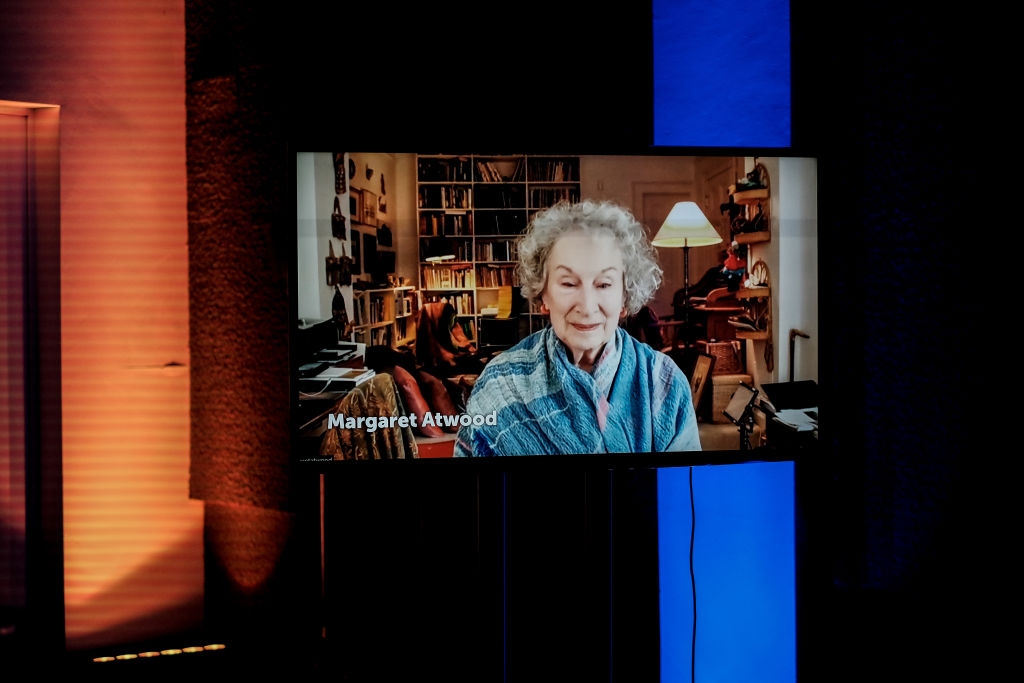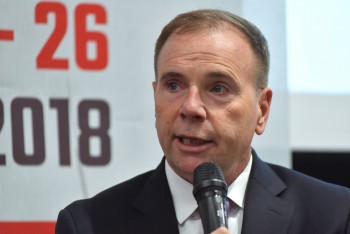Editor’s Note: This interview has been edited and condensed for clarity.
Margaret Atwood, Canadian author of generation-defining dystopias “The Handmaid’s Tale” and “The Testaments,” is used to drawing her inspiration from history.
Born in 1939, she based much of her fiction on true events of World War II and its aftermath.
At 83, Atwood got to witness another cataclysmic event when Russia began a full-scale invasion of Ukraine.
She had a birdwatching trip to Ukraine scheduled for March but didn’t cancel it until late February, thinking “surely they (Russia) wouldn’t do anything that stupid.”
When the all-out war began, Atwood used her publicity to voice support for Ukraine’s fight. From joining rallies in Toronto to speaking at the Lviv Book Forum, Atwood encourages support from her audience and relies on historical context to make sense of the war. Sometimes that involves a fair share of doomscrolling.
The Kyiv Independent spoke with Atwood on Oct. 14 in Palo Alto, California, to find out how she disentangles fact from fiction online, reconciles history with current events and what is her vision of Ukraine’s reconstruction.
The Kyiv Independent: In one of your interviews, you talked about the stories nations tell. More specifically, you were comparing Canada and the U.S. How do you view the stories coming from Russia and Ukraine right now?
Margaret Atwood: The Russian narrative doesn't really stand up very well, the “denazification” type of thing. If you're going to invade every place that has Nazis, you're going to have a long list. You can invade Germany, you can invade the United States, there are Nazis in both of them. You can invade Canada, we’ve got some Nazis too. So good try but not buying it.
And the other one, Russia protecting itself — from what? Nobody in their right mind would ever invade Russia, it is too big. Everybody, who has ever invaded, has had a horrible experience.
The Kyiv Independent: In your books, “The Handmaid's Tale” and “The Testaments,” the propaganda spread is limited to the Republic of Gilead. Looking at how propaganda is spreading now — it extends far beyond the Russian borders, and it reaches everyone. How did this inform how you view propaganda?
Margaret Atwood: There's a difference between writing a novel and being in real life. So writing a novel, you are focused on what’s in the novel, but propaganda has always been widespread. I would say, since the newspaper, the radio, and the movies — those were the big propaganda machines in the first part of the 20th century. After that, it became television as well. And now it's the internet, but it's nothing new. Fascism got a big boost from the radio. Then World War II starts and we get newsreels. We look at some of those old newsreels – it's pure propaganda. And the radio was also very big in World War II. That’s how people got their news mostly, plus newspapers but the radio was very immediate. And if you think that wasn't censored, you're wrong. Of course, it was.
The Kyiv Independent: In your books, the focus has been on the experience of women in authoritarian states. As we have witnessed in the war in Ukraine, women have been a great part of the war effort, both going to fight and volunteering. They also suffered from it greatly, as we see cases of sexual violence.
Margaret Atwood: This is not new. That goes back to the Trojan War. It’s an old motif, it's one of the things that always happens in war. But yes, wars are not good for women. They are not good for men either. Wars are bad but sometimes you don't have a choice.
The Kyiv Independent: Has the experience of Ukrainian women that you have been witnessing changed your perspective on what people can do in the moment to help them?
Margaret Atwood: No, it has validated it. Women were quite active in World War II and then their activities got papered over as it often happens.
The Kyiv Independent: What are some of the things we can do right now to prevent the female experiences from getting papered over?
MA: You write about them. But it’s hard to write about things at the time they are happening. First of all, you don't want to give anybody away. And second, you don't have perspective because you're right in the middle of it and you don't know how it's going to come out. So, you don't know the importance of an action or a moment until afterward. And all wars are like that, old battles are like that. When you're in the middle of it, you don't actually know what's going on. And because it's very granular — these people are doing this, those people are doing that — we are not going to see how that all fits together until afterward.
The Kyiv Independent: During your talk at the Lviv Book Forum, you mentioned a Ukrainian anthology that you have been reading.
Margaret Atwood: Yeah, it's not a recent one. It's a couple of years old but they republished it at this moment. However, I predict that they're going to put together a more recent one. Since this (war) began, people must have been writing about it. So, when people say to me, “Well, what are you going to write about Ukraine?” I say, “It's not me who is going to write it, it's the people there…”

Margaret Atwood, Canadian award-winning author, speaks during the 29th Lviv Book Forum on Oct. 8, 2022, in Lviv, Ukraine. (Photo by Les Kasyanov/Global Images Ukraine via Getty Images)
The Kyiv Independent: When did you start learning more about Ukraine?
Margaret Atwood: I have just always seemed to have known about it. You can't read much about World War II without galloping over Ukraine, galloping back over Ukraine. It’s just there. And I knew about the famine (Holodomor), of course. If you're studying anything about Soviet Russia, there it is. You can't avoid it — a very deliberate, wretched, bad.
The Kyiv Independent: How have you been keeping up with the news?
Margaret Atwood: Doomscrolling a lot. Well, you often see things on social media before you see them in mainstream press. If you see them there, you are not sure they are real. That is the problem. So, I have a couple of keywords that I'm fixated on right now. A few weeks ago it was Lyman, before that it was Izium, right now it’s Svatove and Nova Kakhovka. So, I look them up every day just to see if anything has happened. Sometimes you wake up in the morning — what just happened? They blew up the (Crimean) bridge.
The Kyiv Independent: Before the all-out war began many people didn’t believe Putin would invade further. What do you think made many of us look at all the signaling and remain in disbelief?
Margaret Atwood: It's hope, and it's also rationality. They think “this would be so stupid, surely nobody would do it.” And they do it… So I explain to people that wars happen for two reasons. Somebody wants somebody else's stuff. And they think they can win. Sometimes thinking they can win is justified and sometimes it is not justified. But if there's no stuff that they want, they don't bother. Ukraine has a lot of natural resources, access to the Black Sea, and control of that area…There's a lot of reasons for wanting it, but none of them are the reasons that they are admitting. They're going with “the soul of whatnot” and the “essentialist whatnot” and “the novel whatnot.” But it really is the stuff. It's the loot.
Nobody starts a war if they think they can't win. They get into defensive wars for that reason. But they don't initiate wars unless they think they can win. That was a miscalculation, wasn’t it?
If (President Volodymyr) Zelensky had left, it would have been game over. And you can't make it up: It's a guy who had a role playing the president of Ukraine, then becomes the president of Ukraine and becomes this heroic figure having started as a comedian. You just really can't invent it.
The Kyiv Independent: Were you following the 2019 presidential election closely? What did you make of it as it was happening?
Margaret Atwood: I was following it very closely. He is a script writer…I think people get more inspiration from movies than we give them credit for. A lot of politics is acting as you have probably figured out. Zelensky had a better act.
I don’t think he was prepared for it (the war). I think his military was prepared and he couldn't have done this without the backing of the military, obviously.
The Kyiv Independent: In addition to non-fiction, it is valuable for people to read fiction to make sense of the things that are happening. Do you have any book recommendations, any dystopias?
Margaret Atwood: They are gloomy. So let us not speak of them right now. Let us instead speak of the project I'm doing called Practical Utopias. It has assembled 200 people from about 138 countries… We're giving them Lego blocks of new materials, new processes with the goal to make practical better possibilities.
I'm gonna say something really quite annoying. These places that have been so destroyed, when they rebuild them — this is a kind of perfect place to put better into practice. And I'm guessing that a lot of people will be offering their inventions and services, their new stuff to make better from the ground up…So that is a positive way of looking at it. It's not what you would wish, you would not. You wouldn’t wish for this opportunity to have appeared but it could be an opportunity. It could be the template for the future — that’s my utopian vision.












